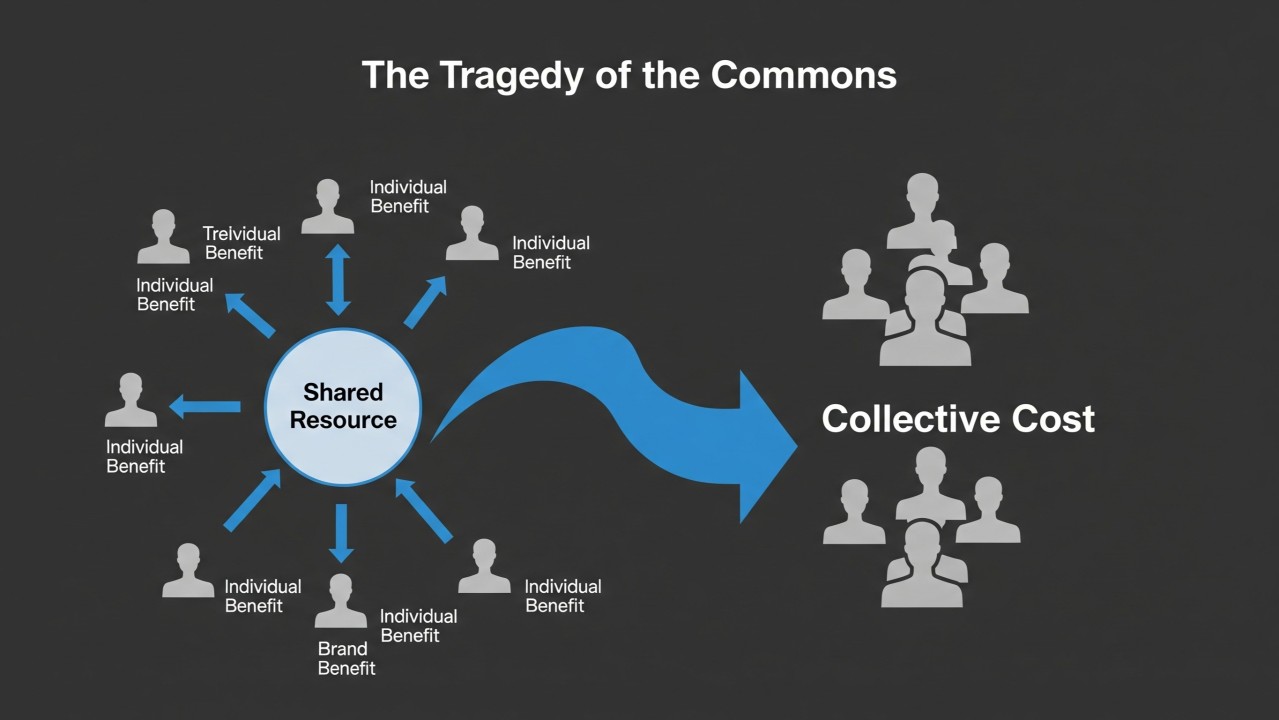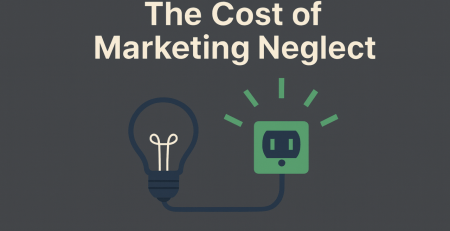From Grazing to Gazing: The Invisible System Draining Your Business, Brand, and Attention
In the late 19th century, the vast Texas Panhandle, where I grew up, bore witness to a true story of ranching resilience.
The XIT Ranch sprawling across over three million acres, was born from a land deal to fund the Texas Capitol, managed by Chicago investors and local hands. Ranchers drove thousands of cattle onto the open range, each seeking to maximize their herds.
For decades, the land supported this growth, but by the 1880s, overgrazing took its toll. The grass dwindled, water sources strained, and the 1886-1887 harsh winters decimated herds, forcing many to rethink their ways. A few ranchers, inspired by the crisis, began rotating grazing and conserving water, a rare act of stewardship amid the scramble.
Today, our modern pasture is audience attention, grazed by automated content and outreach. As marketers flood feeds with AI-driven volume, trust and visibility erode, echoing the Panhandle’s past.
Yet, like the forward-thinking ranchers, some are shifting from grazing mindlessly to gazing purposefully: building signal over noise and avoiding the systemic trap we look at in today’s article.
The Tragedy of the Commons in Modern Business
When every agency automates outreach; every brand floods social feeds; every marketer publishes with AI at scale.
There is nothing wrong with the tools. The initial content may be valuable. But systems get overloaded when too many players use the same resource in the same way.
This dynamic is called the Tragedy of the Commons. In 2025, it remains one of the most common and dangerous patterns in business.
The Original Idea
The term originated in 1833 from economist William Forster Lloyd and was later popularized by ecologist Garrett Hardin in 1968. Peter Senge later included it in his system archetypes. The concept is straightforward: a group shares a limited resource; each person acts in their own interest, taking a little more; the cost is distributed, but the benefit is individual.
Eventually, the shared resource is depleted. In marketing, this occurs when everyone adopts the latest tactic, spamming users and eroding trust and attention into sources of distraction and irritation.
Consider a public pasture. Each farmer adds another cow; the land gets overgrazed; milk output rises for one, but the field weakens for all. The collapse happens not because of one selfish actor, but because the system incentivizes selfish behavior.
The Modern Commons
Today, we are not grazing fields. We are grazing:
- Audience attention
- Customer trust
- Inbox capacity
- Search engine visibility
- Creative messaging space
- Team energy
AI makes extracting these resources faster and easier. That does not mean it makes it better.
When everyone uses the same tactics in the same way, the system breaks. The tragedy repeats.
Five Ways the Tragedy Appears in Modern Business
- Content Overproduction Everyone uses AI to publish more content: more posts, more blogs, more volume. Shared resource: audience attention and organic reach. System response: algorithms tighten; feeds get flooded; users disengage. Result: even high-quality content gets ignored.
- Outreach Saturation Sales teams and consultants send mass DMs and emails, enabled by automation tools. Shared resource: buyer openness. System response: buyers block, ignore, or filter messages. Result: trust erodes; effective outreach becomes harder.
- Undercutting With AI Agencies and freelancers use AI to lower prices, competing on speed and volume. Shared resource: perceived value of strategic work. System response: clients expect more for less. Result: prices and quality drop; work becomes commoditized.
- Decision Fatigue Teams rely on AI for strategy, planning, writing, and ideas. Shared resource: strategic clarity. System response: groupthink, reactive culture, and shallow execution. Result: leaders feel busier but achieve less.
- Search Engine Collapse Mass AI-generated content floods search rankings, as seen in SEO spam on platforms like Google. Shared resource: visibility. System response: search engines penalize low-quality content; human-created content gets buried. Result: SEO loses effectiveness unless you are at the top of the trust pyramid.
False Solutions That Worsen the Problem
- “Write better prompts.” This does not address saturation. It keeps you in the same overcrowded game.
- “Regulate tool access.” This creates control issues and gatekeeping, not innovation.
- “Do more, faster.” This may win short-term gains but damages the long-term market.
Real Solutions to Shift the System
- Use AI for depth, not just speed Consider using AI to refine ideas, clarify messages, or test strategies, not just to produce more. Tools work best when guided by focus and purpose. Leadership. Strategy.
- Protect and earn attention Avoid spamming feeds. Build trust. Create fewer, high-impact pieces that resonate. Say something memorable.
- Build closed systems Grow your email list, cultivate a high-trust audience, or host a private group. Create your own commons and lead it thoughtfully.
- Lead through clarity, not velocity While competitors panic, build frameworks. Create relevance, not noise.
- Educate the market Clients are confused about AI. Show them where it excels and where it falls short. Avoid overselling; prioritize overeducating to build long-term positioning.
The Smartest Leaders Are Not Just Efficient
They understand systems.
They protect resources, not just exploit them. They shape culture, not just react to it. They prioritize trust and differentiation over speed and scale.
That makes them rare.
Questions for Reflection
- Where are we overusing a shared resource without realizing it?
- Where are we extracting value without replenishing it?
- What principle would help us reset the system we are in?
- What resource do we need to protect more than we push?
- Are we following or leading in our messaging?
- Are we operating from fear of scarcity or confidence in our business, service, product, or message?
The Tragedy of the Commons is not about bad intentions. It is about incentives and unchecked momentum.
You do not fix it by doing more. You fix it by thinking clearly, acting early, and stewarding value.
While others flood the field, build signal. While others chase prompts, build presence. While others race, build resonance.




Leave a Reply